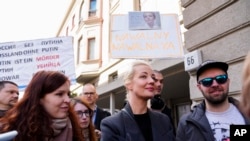Russian President Vladimir Putin is expected to win another six-year term Sunday in elections that have no real opposition, even as some Russians turned up at polling stations across the country to stage protests against his all but certain victory.
Putin, 71, is set to extend his nearly quarter century of rule for another six years after a harsh crackdown on dissent that has seen journalists jailed and the February death of Russia’s most prominent opposition leader Alexey Navalny.
The election, which began Friday, has taken place in the absence of any real opposition or alternatives to Putin.
Still, scores of people turned up at polling stations across Russia on Sunday to engage in what the anti-Kremlin opposition said was a symbolic protest of Putin’s reelection.
Associates of Putin’s top critic Navalny encouraged people to take part in the protest, which Navalny himself endorsed shortly before his death in a Siberian prison last month.
For the protest, called “Noon against Putin,” Russians who are unhappy with Putin went to their local polling station at midday to either vote for one of the three candidates running against Putin, or spoil their ballot in protest.
Others, meanwhile, said they would write in Navalny’s name, whose death last month prompted grassroots memorials across the country that Russian authorities were quick to stamp out.
Several dozen cases of vandalism at polling stations were also reported.
The group OVD-Info, which tracks political arrests in Russia, said that more than 50 people were arrested in 14 cities across Russia on Sunday.
Similar protests appeared to take place at Russian embassies around the world. At polling stations at Russian diplomatic missions in Australia and Armenia, Kazakhstan and Japan, hundreds of Russians stood in line at noon.
And in the German capital of Berlin, Navalny’s widow, Yulia Navalnaya, who has become the face of his campaign following his death, appeared at the Russian embassy to take part in the protest, while others present clapped and chanted her name.
“Alexey was fighting for very simple things: for freedom of speech, for fair elections, for democracy and our right to live without corruption and war,” Navalnaya said in a message to a rally in Budapest on March 15. “Putin is not Russia. Russia is not Putin.”
But despite the show of opposition to Putin, the longtime Russian leader is almost guaranteed to win reelection. Assuming he does, and if he completes that six-year term, he would pass Josef Stalin and become Russia’s longest-serving leader in more than two centuries.
The election takes place against the backdrop of Russia’s ongoing war in Ukraine, which is now in its third year. Leading up to the election, Putin portrayed the war as an existential fight for Russia against the West.
Some information in this report came from Reuters and The Associated Press.

